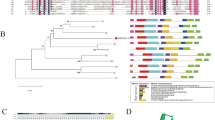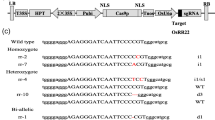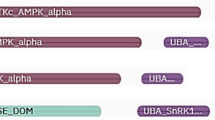Abstract
A high concentration of sodium (Na+) is the primary stressor for plants in high salinity environments. The Salt Overly Sensitive (SOS) pathway is one of the best-studied signal transduction pathways, which confers plants the ability to export too much Na+ out of the cells or translocate the cytoplasmic Na+ into the vacuole. In this study, the Salt Overly Sensitive3 (MpSOS3) gene from Pongamia (Millettia pinnata Syn. Pongamia pinnata), a semi-mangrove, was isolated and characterized. The MpSOS3 protein has canonical EF-hand motifs conserved in other calcium-binding proteins and an N-myristoylation signature sequence. The MpSOS3 gene was significantly induced by salt stress, especially in Pongamia roots. Expression of the wild-type MpSOS3 but not the mutated nonmyristoylated MpSOS3-G2A could rescue the salt-hypersensitive phenotype of the Arabidopsis sos3-1 mutant, which suggested the N-myristoylation signature sequence of MpSOS3 was required for MpSOS3 function in plant salt tolerance. Heterologous expression of MpSOS3 in Arabidopsis accumulated less H2O2, superoxide anion radical (O2−), and malondialdehyde (MDA) than wild-type plants, which enhanced the salt tolerance of transgenic Arabidopsis plants. Under salt stress, MpSOS3 transgenic plants accumulated a lower content of Na+ and a higher content of K+ than wild-type plants, which maintained a better K+/Na+ ratio in transgenic plants. Moreover, no development and growth discrepancies were observed in the MpSOS3 heterologous overexpression plants compared to wild-type plants. Our results demonstrated that the MpSOS3 pathway confers a conservative salt-tolerant role and provided a foundation for further study of the SOS pathway in Pongamia.
Key message
Heterologous expression of Millettia pinnata salt overly sensitive3 (SOS3) gene enhances salt stress tolerance in Arabidopsis.








Similar content being viewed by others
Data availability
The full length of MpSOS3 cDNA is available in GenBank with an Accession Number: MZ934393.1.
References
Ali A, Petrov V, Yun DJ, Gechev T (2023) Revisiting plant salt tolerance: novel components of the SOS pathway. Trends Plant Sci 28:1060–1069. https://doi.org/10.1016/j.tplants.2023.04.003
Batistic O, Waadt R, Steinhorst L, Held K, Kudla J (2010) CBL-mediated targeting of CIPKs facilitates the decoding of calcium signals emanating from distinct cellular stores. Plant J 61:211–222. https://doi.org/10.1111/j.1365-313X.2009.04045.x
Baxter A, Mittler R, Suzuki N (2014) ROS as key players in plant stress signalling. J Exp Bot 65:1229–1240. https://doi.org/10.1093/jxb/ert375
Cao Y, Shan T, Fang H, Sun K, Shi W, Tang B, Wu J, Wang K, Li P, Wang B (2022) Genome-wide analysis reveals the spatiotemporal expression patterns of SOS3 genes in the maize B73 genome in response to salt stress. BMC Genom 23:60. https://doi.org/10.1186/s12864-021-08287-6
Chen J, Xiao Q, Wu F, Dong X, He J, Pei Z, Zheng H (2010) Nitric oxide enhances salt secretion and Na(+) sequestration in a mangrove plant, Avicennia marina, through increasing the expression of H(+)-ATPase and Na(+)/H(+) antiporter under high salinity. Tree Physiol 30:1570–1585. https://doi.org/10.1093/treephys/tpq086
Chen X, Lu X, Shu N, Wang D, Wang S, Wang J, Guo L, Guo X, Fan W, Lin Z, Ye W (2017) GhSOS1, a plasma membrane Na+/H+ antiporter gene from upland cotton, enhances salt tolerance in transgenic Arabidopsis thaliana. PLoS ONE 12:e0181450. https://doi.org/10.1371/journal.pone.0181450
Fan Y, Yin X, Xie Q, Xia Y, Wang Z, Song J, Zhou Y, Jiang X (2019) Co-expression of SpSOS1 and SpAHA1 in transgenic Arabidopsis plants improves salinity tolerance. BMC Plant Biol 19:74. https://doi.org/10.1186/s12870-019-1680-7
Flowers TJ, Colmer TD (2008) Salinity tolerance in halophytes. New Phytol 179:945–963. https://doi.org/10.1111/j.1469-8137.2008.02531.x
Fu H, Yu X, Jiang Y, Wang Y, Yang Y, Chen S, Chen Q, Guo Y (2023) SALT OVERLY SENSITIVE 1 is inhibited by clade D protein phosphatase 2C D6 and D7 in Arabidopsis thaliana. Plant Cell 35:279–297. https://doi.org/10.1093/plcell/koac283
Gamez-Arjona F, Park HJ, Garcia E, Aman R, Villalta I, Raddatz N, Carranco R, Ali A, Ali Z, Zareen S, De Luca A, Leidi EO, Daniel-Mozo M, Xu ZY, Albert A, Kim WY, Pardo JM, Sanchez-Rodriguez C, Yun DJ, Quintero FJ (2024) Inverse regulation of SOS1 and HKT1 protein localization and stability by SOS3/CBL4 in Arabidopsis thaliana. Proc Natl Acad Sci USA 121:e2320657121. https://doi.org/10.1073/pnas.2320657121
Gao S, Yuan L, Zhai H, Liu C-l, He S-z, Liu Q-c (2012) Overexpression of SOS genes enhanced salt tolerance in sweetpotato. J Integr Agric 11:378–386. https://doi.org/10.1016/S2095-3119(12)60022-7
Gao J, Sun J, Cao P, Ren L, Liu C, Chen S, Chen F, Jiang J (2016) Variation in tissue Na(+) content and the activity of SOS1 genes among two species and two related genera of Chrysanthemum. BMC Plant Biol 16:98. https://doi.org/10.1186/s12870-016-0781-9
Gong D, Guo Y, Schumaker KS, Zhu JK (2004) The SOS3 family of calcium sensors and SOS2 family of protein kinases in Arabidopsis. Plant Physiol 134:919–926. https://doi.org/10.1104/pp.103.037440
Halfter U, Ishitani M, Zhu JK (2000) The Arabidopsis SOS2 protein kinase physically interacts with and is activated by the calcium-binding protein SOS3. Proc Natl Acad Sci USA 97:3735–3740. https://doi.org/10.1073/pnas.040577697
Huang J, Lu X, Yan H, Chen S, Zhang W, Huang R, Zheng Y (2012) Transcriptome characterization and sequencing-based identification of salt-responsive genes in Millettia pinnata, a semi-mangrove plant. DNA Res 19:195–207. https://doi.org/10.1093/dnares/dss004
Ishitani M, Liu J, Halfter U, Kim CS, Shi W, Zhu JK (2000) SOS3 function in plant salt tolerance requires N-myristoylation and calcium binding. Plant Cell 12:1667–1678. https://doi.org/10.1105/tpc.12.9.1667
Ji H, Pardo JM, Batelli G, Van Oosten MJ, Bressan RA, Li X (2013) The Salt Overly Sensitive (SOS) pathway: established and emerging roles. Mol Plant 6:275–286. https://doi.org/10.1093/mp/sst017
Kanwar P, Sanyal SK, Tokas I, Yadav AK, Pandey A, Kapoor S, Pandey GK (2014) Comprehensive structural, interaction and expression analysis of CBL and CIPK complement during abiotic stresses and development in rice. Cell Calcium 56:81–95. https://doi.org/10.1016/j.ceca.2014.05.003
Kumar S, Stecher G, Li M, Knyaz C, Tamura K (2018) MEGA X: molecular evolutionary genetics analysis across computing platforms. Mol Biol Evol 35:1547–1549. https://doi.org/10.1093/molbev/msy096
Kushwaha HR, Kumar G, Verma PK, Singla-Pareek SL, Pareek A (2011) Analysis of a salinity induced BjSOS3 protein from Brassica indicate it to be structurally and functionally related to its ortholog from Arabidopsis. Plant Physiol Biochem 49:996–1004. https://doi.org/10.1016/j.plaphy.2011.03.013
Letunic I, Khedkar S, Bork P (2020) SMART: recent updates, new developments and status in 2020. Nucleic Acids Res 49:D458–D460. https://doi.org/10.1093/nar/gkaa937
Lewit-Bentley A, Rety S (2000) EF-hand calcium-binding proteins. Curr Opin Struct Biol 10:637–643. https://doi.org/10.1016/s0959-440x(00)00142-1
Li J, Shen L, Han X, He G, Fan W, Li Y, Yang S, Zhang Z, Yang Y, Jin W, Wang Y, Zhang W, Guo Y (2023) Phosphatidic acid-regulated SOS2 controls sodium and potassium homeostasis in Arabidopsis under salt stress. EMBO J. https://doi.org/10.15252/embj.2022112401
Liu JP, Zhu JK (1997) An Arabidopsis mutant that requires increased calcium for potassium nutrition and salt tolerance. Proc Natl Acad Sci USA 94:14960–14964. https://doi.org/10.1073/pnas.94.26.14960
Liu JP, Zhu JK (1998) A calcium sensor homolog required for plant salt tolerance. Sci 280:1943–1945. https://doi.org/10.1126/science.280.5371.1943
Liu J, Ishitani M, Halfter U, Kim CS, Zhu JK (2000) The Arabidopsis thaliana SOS2 gene encodes a protein kinase that is required for salt tolerance. Proc Natl Acad Sci U S A 97:3730–3734. https://doi.org/10.1073/pnas.97.7.3730
Liu Z, Xie Q, Tang F, Wu J, Dong W, Wang C, Gao C (2020) The ThSOS3 Gene improves the salt tolerance of transgenic Tamarix hispida and Arabidopsis thaliana. Front Plant Sci 11:597480. https://doi.org/10.3389/fpls.2020.597480
Ma Y, Wang L, Wang J, Zhong Y, Cheng ZM (2019) Isolation and expression analysis of Salt Overly Sensitive gene family in grapevine (Vitis vinifera) in response to salt and PEG stress. PLoS ONE 14:e0212666. https://doi.org/10.1371/journal.pone.0212666
Madadi K, Ahmadabadi M, Pazhouhandeh M (2022) Heterologous expression of Arabidopsis SOS3 increases salinity tolerance in Petunia. Mol Biol Rep 49:6553–6562. https://doi.org/10.1007/s11033-022-07495-x
Madeira F, Park YM, Lee J, Buso N, Gur T, Madhusoodanan N, Basutkar P, Tivey ARN, Potter SC, Finn RD, Lopez R (2019) The EMBL-EBI search and sequence analysis tools APIs in 2019. Nucleic Acids Res 47:W636–W641. https://doi.org/10.1093/nar/gkz268
Marriboina S, Sengupta D, Kumar S, Reddy AR (2017) Physiological and molecular insights into the high salinity tolerance of Pongamia pinnata (L.) pierre, a potential biofuel tree species. Plant Sci 258:102–111. https://doi.org/10.1016/j.plantsci.2017.02.008
Marriboina S, Sharma K, Sengupta D, Yadavalli AD, Sharma RP, Reddy Attipalli R (2021) Evaluation of high salinity tolerance in Pongamia pinnata (L.) pierre by a systematic analysis of hormone-metabolic network. Physiol Plant 173:1514–1534. https://doi.org/10.1111/ppl.13486
Martinez-Atienza J, Jiang X, Garciadeblas B, Mendoza I, Zhu JK, Pardo JM, Quintero FJ (2007) Conservation of the salt overly sensitive pathway in rice. Plant Physiol 143:1001–1012. https://doi.org/10.1104/pp.106.092635
Maughan PJ, Turner TB, Coleman CE, Elzinga DB, Jellen EN, Morales JA, Udall JA, Fairbanks DJ, Bonifacio A (2009) Characterization of Salt Overly Sensitive 1 (SOS1) gene homoeologs in quinoa (Chenopodium quinoa Willd.). Genome 52:647–657. https://doi.org/10.1139/G09-041
Nizam A, Meera SP, Kumar A (2022) Genetic and molecular mechanisms underlying mangrove adaptations to intertidal environments. iScience 25:103547. https://doi.org/10.1016/j.isci.2021.103547
Nutan KK, Kumar G, Singla-Pareek SL, Pareek A (2018) A Salt Overly Sensitive Pathway member from Brassica juncea BjSOS3 can functionally complement ΔAtsos3 in Arabidopsis. Curr Genomics 19:60–69. https://doi.org/10.2174/1389202918666170228133621
Oh DH, Leidi E, Zhang Q, Hwang SM, Li Y, Quintero FJ, Jiang X, D’Urzo MP, Lee SY, Zhao Y, Bahk JD, Bressan RA, Yun DJ, Pardo JM, Bohnert HJ (2009) Loss of halophytism by interference with SOS1 expression. Plant Physiol 151:210–222. https://doi.org/10.1104/pp.109.137802
Olias R, Eljakaoui Z, Li J, De Morales PA, Marin-Manzano MC, Pardo JM, Belver A (2009) The plasma membrane Na+/H+ antiporter SOS1 is essential for salt tolerance in tomato and affects the partitioning of Na+ between plant organs. Plant Cell Environ 32:904–916. https://doi.org/10.1111/j.1365-3040.2009.01971.x
Parida AK, Jha B (2010) Salt tolerance mechanisms in mangroves: a review. Trees 24:199–217. https://doi.org/10.1007/s00468-010-0417-x
Park HJ, Gamez-Arjona FM, Lindahl M, Aman R, Villalta I, Cha JY, Carranco R, Lim CJ, Garcia E, Bressan RA, Lee SY, Valverde F, Sanchez-Rodriguez C, Pardo JM, Kim WY, Quintero FJ, Yun DJ (2023) S-acylated and nucleus-localized SALT OVERLY SENSITIVE3/CALCINEURIN B-LIKE4 stabilizes GIGANTEA to regulate Arabidopsis flowering time under salt stress. Plant Cell 35:298–317. https://doi.org/10.1093/plcell/koac289
Qiu QS, Guo Y, Dietrich MA, Schumaker KS, Zhu JK (2002) Regulation of SOS1, a plasma membrane Na+/H+ exchanger in Arabidopsis thaliana, by SOS2 and SOS3. Proc Natl Acad Sci U S A 99:8436–8441. https://doi.org/10.1073/pnas.122224699
Quan R, Lin H, Mendoza I, Zhang Y, Cao W, Yang Y, Shang M, Chen S, Pardo JM, Guo Y (2007) SCABP8/CBL10, a putative calcium sensor, interacts with the protein kinase SOS2 to protect Arabidopsis shoots from salt stress. Plant Cell 19:1415–1431. https://doi.org/10.1105/tpc.106.042291
Rajput M, Bithel N, Vijayakumar S (2021) Antimicrobial, antibiofilm, antioxidant, anticancer, and phytochemical composition of the seed extract of Pongamia pinnata. Arch Microbiol 203:4005–4024. https://doi.org/10.1007/s00203-021-02365-9
Rivandi J, Miyazaki J, Hrmova M, Pallotta M, Tester M, Collins NC (2011) A SOS3 homologue maps to HvNax4, a barley locus controlling an environmentally sensitive Na+ exclusion trait. J Exp Bot 62:1201–1216. https://doi.org/10.1093/jxb/erq346
Shi H, Ishitani M, Kim C, Zhu JK (2000) The Arabidopsis thaliana salt tolerance gene SOS1 encodes a putative Na+/H+ antiporter. Proc Natl Acad Sci U S A 97:6896–6901. https://doi.org/10.1073/pnas.120170197
Sun Y, Zhao J, Li X, Li Y (2020) E2 conjugases UBC1 and UBC2 regulate MYB42-mediated SOS pathway in response to salt stress in Arabidopsis. New Phytol 227:455–472. https://doi.org/10.1111/nph.16538
Villalta I, Garcia E, Hornero-Mendez D, Carranco R, Tello C, Mendoza I, De Luca A, Andres Z, Schumacher K, Pardo JM, Quintero FJ (2021) Distinct roles of N-terminal fatty acid acylation of the salinity-sensor protein SOS3. Front Plant Sci 12:691124. https://doi.org/10.3389/fpls.2021.691124
Wang M, Gu D, Liu T, Wang Z, Guo X, Hou W, Bai Y, Chen X, Wang G (2007) Overexpression of a putative maize calcineurin B-like protein in Arabidopsis confers salt tolerance. Plant Mol Biol 65:733–746. https://doi.org/10.1007/s11103-007-9238-8
Wang L, Mu M, Li X, Lin P, Wang W (2010) Differentiation between true mangroves and mangrove associates based on leaf traits and salt contents. J Plant Ecol 4:292–301. https://doi.org/10.1093/jpe/rtq008
Wang H, Hu T, Huang J, Lu X, Huang B, Zheng Y (2013) The expression of Millettia pinnata chalcone isomerase in Saccharomyces cerevisiae salt-sensitive mutants enhances salt-tolerance. Int J Mol Sci 14:8775–8786. https://doi.org/10.3390/ijms14058775
Wang Y, Pan C, Chen Q, Xie Q, Gao Y, He L, Li Y, Dong Y, Jiang X, Zhao Y (2023) Architecture and autoinhibitory mechanism of the plasma membrane Na+/H+ antiporter SOS1 in Arabidopsis. Nat Commun 14:4487. https://doi.org/10.1038/s41467-023-40215-y
Wang S, Jiang R, Feng J, Zou H, Han X, Xie X, Zheng G, Fang C, Zhao J (2024) Overexpression of transcription factor FaMYB63 enhances salt tolerance by directly binding to the SOS1 promoter in Arabidopsis thaliana. Plant Mol Biol 114:32. https://doi.org/10.1007/s11103-024-01431-2
Wu SJ, Ding L, Zhu JK (1996) SOS1, a genetic locus essential for salt tolerance and potassium acquisition. Plant Cell 8:617–627. https://doi.org/10.1105/tpc.8.4.617
Wu X, Xu J, Meng X, Fang X, Xia M, Zhang J, Cao S, Fan T (2022) Linker histone variant HIS1-3 and WRKY1 oppositely regulate salt stress tolerance in Arabidopsis. Plant Physiol 189:1833–1847. https://doi.org/10.1093/plphys/kiac174
Xi Y, Liu J, Dong C, Cheng ZM (2017) The CBL and CIPK gene family in grapevine (Vitis vinifera): genome-wide analysis and expression profiles in response to various abiotic stresses. Front Plant Sci 8:978. https://doi.org/10.3389/fpls.2017.00978
Yadav NS, Shukla PS, Jha A, Agarwal PK, Jha B (2012) The SbSOS1 gene from the extreme halophyte Salicornia brachiata enhances Na(+) loading in xylem and confers salt tolerance in transgenic tobacco. BMC Plant Biol 12:188. https://doi.org/10.1186/1471-2229-12-188
Yang Y, Guo Y (2018) Elucidating the molecular mechanisms mediating plant salt-stress responses. New Phytol 217:523–539. https://doi.org/10.1111/nph.14920
Yang Q, Chen ZZ, Zhou XF, Yin HB, Li X, Xin XF, Hong XH, Zhu JK, Gong Z (2009) Overexpression of SOS (Salt Overly Sensitive) genes increases salt tolerance in transgenic Arabidopsis. Mol Plant 2:22–31. https://doi.org/10.1093/mp/ssn058
Yang Y, Tang RJ, Jiang CM, Li B, Kang T, Liu H, Zhao N, Ma XJ, Yang L, Chen SL, Zhang HX (2015) Overexpression of the PtSOS2 gene improves tolerance to salt stress in transgenic poplar plants. Plant Biotechnol J 13:962–973. https://doi.org/10.1111/pbi.12335
Yang H, Zhang Y, Liu Y, Jian S, Deng S (2023) A novel ABA-induced transcript factor from Millettia pinnata, MpAITR1, enhances salt and drought tolerance through ABA signaling in transgenic Arabidopsis. J Plant Physiol 288:154060. https://doi.org/10.1016/j.jplph.2023.154060
Yu Z, Yan H, Liang L, Zhang Y, Yang H, Li W, Choi J, Huang J, Deng S (2021) A C2H2-type zinc-finger protein from Millettia pinnata, MpZFP1, enhances salt tolerance in transgenic Arabidopsis. Int J Mol Sci 22:10832. https://doi.org/10.3390/ijms221910832
Zhang Y, Huang J, Hou Q, Liu Y, Wang J, Deng S (2021) Isolation and functional vharacterization of a salt-responsive calmodulin-like gene MpCML40 from semi-Mangrove Millettia pinnata. Int J Mol Sci 22:3475. https://doi.org/10.3390/ijms22073475
Zhang M, Cao J, Zhang T, Xu T, Yang L, Li X, Ji F, Gao Y, Ali S, Zhang Q, Zhu J, Xie L (2022) A putative plasma membrane na(+)/h(+) antiporter GmSOS1 is critical for salt stress tolerance in Glycine max. Front Plant Sci 13:870695. https://doi.org/10.3389/fpls.2022.870695
Zhang XY, Tang LH, Nie JW, Zhang CR, Han X, Li QY, Qin L, Wang MH, Huang X, Yu F, Su M, Wang Y, Xu RM, Guo Y, Xie Q, Chen YH (2023) Structure and activation mechanism of the rice Salt Overly Sensitive 1 (SOS1) Na+/H+ antiporter. Nat Plants 9:1924–1936. https://doi.org/10.1038/s41477-023-01551-5
Zhao C, William D, Sandhu D (2021) Isolation and characterization of Salt Overly Sensitive family genes in spinach. Physiol Plant 171:520–532. https://doi.org/10.1111/ppl.13125
Zhou X, Li J, Wang Y, Liang X, Zhang M, Lu M, Guo Y, Qin F, Jiang C (2022) The classical SOS pathway confers natural variation of salt tolerance in maize. New Phytol 236:313–315. https://doi.org/10.1111/nph.18278
Zhu JK (2002) Salt and drought stress signal transduction in plants. Annu Rev Plant Biol 53:247–273. https://doi.org/10.1146/annurev.arplant.53.091401.143329
Acknowledgements
We appreciate Dr. Jianzi Huang (Shenzhen University, China) for providing the Pongamia materials and transcriptome data. We thank Dr. Guangyi Dai and Hui Mo from the Institutional Center for Shared Technologies and Facilities of South China Botanical Garden for technical support of the confocal system and ion content measurement.
Funding
This work was supported by grants from the Funding by Science and Technology Projects in Guangzhou (E33309) and the National Key Research & Development Program of China (2022YFC3103700).
Author information
Authors and Affiliations
Contributions
Yi Zhang and Shuling Deng designed the research, Yi Zhang, Heng Yang, Yujuan Liu, and Qiongzhao Hou performed the experiments, Yi Zhang, Heng Yang, Yujuan Liu, and Qiongzhao Hou analyzed the data, Shuguang Jian provided the funding and resources, Yi Zhang wrote the manuscript and revised by Shuling Deng. All authors read and approved the manuscript.
Corresponding author
Ethics declarations
Conflict of interest
The authors have not declared a conflict of interest.
Additional information
Publisher's Note
Springer Nature remains neutral with regard to jurisdictional claims in published maps and institutional affiliations.
Supplementary Information
Below is the link to the electronic supplementary material.
11103_2024_1459_MOESM2_ESM.pdf
Supplementary file2 (PDF 537 kb)—Seeds germination assay showed that the N-myristoylation of MpSOS3 was essential for salt tolerance function
Rights and permissions
Springer Nature or its licensor (e.g. a society or other partner) holds exclusive rights to this article under a publishing agreement with the author(s) or other rightsholder(s); author self-archiving of the accepted manuscript version of this article is solely governed by the terms of such publishing agreement and applicable law.
About this article
Cite this article
Zhang, Y., Yang, H., Liu, Y. et al. Molecular cloning and characterization of a salt overly sensitive3 (SOS3) gene from the halophyte Pongamia. Plant Mol Biol 114, 57 (2024). https://doi.org/10.1007/s11103-024-01459-4
Received:
Accepted:
Published:
DOI: https://doi.org/10.1007/s11103-024-01459-4




